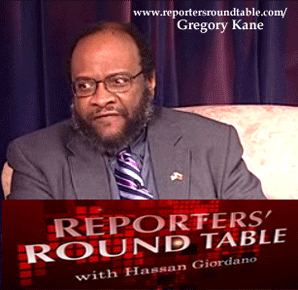




Paul Kenneth Burns on Death Penalty Repeal-Part II
Hussan Giordano interviews Senators Nancy Jacobs and Lisa Gladden, Gregory Kane, and our own Paul Kenneth Burns…
March 3, 2009
Hussan Giordano interviews Senators Nancy Jacobs and Lisa Gladden, Gregory Kane, and our own Paul Kenneth Burns…
March 3, 2009
“The Reporters’ Round Table” Host Hussan Giordano interviews Senators Nancy Jacobs and Lisa Gladden, Gregory Kane, and our own Paul Kenneth Burns in a discussion on the fate of the Maryland death penalty, slots, the stimulus package and the state budget.
Click to watch: Death Penalty Repeal-Part II
It was a great informative and intelligent discussion and well worth the time to watch.
Mr. Burns reports here, “Reporters’ Roundtable,” (http://www.marylandpolitics.us/archives/1288) that this is his “first television appearance…as a political commentator.”
OMG – to be so young…
And for the record, Senators Gladden and Jacobs are a heckuva lot more attractive than Messrs. Burns and Kane.
Links:
http://www.marylandpolitics.us/archives/1288
http://www.reportersroundtable.com/2009/02/death-penaltydebate/
Reporters' Roundtable with Hassan Giordano
http://www.reportersroundtable.com/feed/rss/
www.reportersroundtable.com/
Death Penalty Repeal-Part II
The Death of a Repeal Effort in Maryland?
Maryland’s Fairness Doctrine Bill?
View Show #1 Online
The GOP: The Good Ole Party is dead and gone, what is left of American Conservatism?
20090303 PKBurns on Death Penalty Repeal Part II
Kevin Dayhoff www.kevindayhoff.net http://kevindayhoff.blogspot.com/
3 comments:
2/7/09
To; Maryland Legislators, Prosecutors and
media throughout the region
From: Dudley Sharp, Justice Matters, contact info below
The Death Penalty Provides More Protection for Innocents
Dudley Sharp, Justice Matters, contact info below
Often, the death penalty dialogue gravitates to the subject of innocents at risk of execution. Seldom is a more common problem reviewed. That is, how innocents are more at risk without the death penalty.
To state the blatantly clear, living murderers, in prison, after release or escape, are much more likely to harm and murder, again, than are executed murderers.
Although an obvious truism, it is surprising how often folks overlook the enhanced incapacitation benefits of the death penalty over incarceration.
No knowledgeable and honest party questions that the death penalty has the most extensive due process protections in US criminal law.
Therefore, actual innocents are more likely to be sentenced to life imprisonment and more likely to die in prison serving under that sentence, that it is that an actual innocent will be executed.
That is. logically, conclusive.
16 recent studies, inclusive of their defenses, find for death penalty deterrence.
A surprise? No.
Life is preferred over death. Death is feared more than life.
Some believe that all studies with contrary findings negate those 16 studies. They don't. Studies which don't find for deterrence don't say no one is deterred, but that they couldn't measure those deterred.
What prospect of a negative outcome doesn't deter some? There isn't one . . . although committed anti death penalty folk may say the death penalty is the only one.
However, the premier anti death penalty scholar accepts it as a given that the death penalty is a deterrent, but does not believe it to be a greater deterrent than a life sentence. Yet, the evidence is compelling and un refuted that death is feared more than life.
Some death penalty opponents argue against death penalty deterrence, stating that it's a harsher penalty to be locked up without any possibility of getting out.
Reality paints a very different picture.
What percentage of capital murderers seek a plea bargain to a death sentence? Zero or close to it. They prefer long term imprisonment.
What percentage of convicted capital murderers argue for execution in the penalty phase of their capital trial? Zero or close to it. They prefer long term imprisonment.
What percentage of death row inmates waive their appeals and speed up the execution process? Nearly zero. They prefer long term imprisonment.
This is not, even remotely, in dispute.
Life is preferred over death. Death is feared more than life.
Furthermore, history tells us that lifers have many ways to get out: Pardon, commutation, escape, clerical error, change in the law, etc.
In choosing to end the death penalty, or in choosing not implement it, some have chosen to spare murderers at the cost of sacrificing more innocent lives.
Furthermore, possibly we have sentenced 25 actually innocent people to death since 1973, or 0.3% of those so sentenced. Those have all been released upon post conviction review. The anti death penalty claims, that the numbers are significantly higher, are a fraud, easily discoverable by fact checking.
The innocents deception of death penalty opponents has been getting exposure for many years. Even the behemoth of anti death penalty newspapers, The New York Times, has recognized that deception.
To be sure, 30 or 40 categorically innocent people have been released from death row . . . (1) This when death penalty opponents were claiming the release of 119 "innocents" from death row. Death penalty opponents never required actual innocence in order for cases to be added to their "exonerated" or "innocents" list. They simply invented their own definitions for exonerated and innocent and deceptively shoe horned large numbers of inmates into those definitions - something easily discovered with fact checking.
There is no proof of an innocent executed in the US, at least since 1900.
If we accept that the best predictor of future performance is past performance, we can, reasonably, conclude that the DNA cases will be excluded prior to trial, and that for the next 8000 death sentences, that we will experience a 99.8% accuracy rate in actual guilt convictions. This improved accuracy rate does not include the many additional safeguards that have been added to the system, over and above DNA testing.
Of all the government programs in the world, that put innocents at risk, is there one with a safer record and with greater protections than the US death penalty?
Unlikely.
Full report -All Innocence Issues: The Death Penalty, upon request.
Full report - The Death Penalty as a Deterrent, upon request
(1) The Death of Innocents: A Reasonable Doubt,
New York Times Book Review, p 29, 1/23/05, Adam Liptak,
national legal correspondent for The NY Times
copyright 2007-2009, Dudley Sharp
Permission for distribution of this document, in whole or in part, is approved with proper attribution.
Dudley Sharp, Justice Matters
e-mail sharpjfa@aol.com 713-622-5491,
Houston, Texas
Mr. Sharp has appeared on ABC, BBC, CBS, CNN, C-SPAN, FOX, NBC, NPR, PBS, VOA and many other TV and radio networks, on such programs as Nightline, The News Hour with Jim Lehrer, The O'Reilly Factor, etc., has been quoted in newspapers throughout the world and is a published author.
A former opponent of capital punishment, he has written and granted interviews about, testified on and debated the subject of the death penalty, extensively and internationally.
Pro death penalty sites
http://homicidesurvivors.com/categories/Dudley%20Sharp%20-%20Justice%20Matters.aspx
www.dpinfo.comwww.cjlf.org/deathpenalty/DPinformation.htm
www.clarkprosecutor.org/html/links/dplinks.htm
www.coastda.com/archives.html
www.lexingtonprosecutor.com/death_penalty_debate.htm
www.prodeathpenalty.com
http://yesdeathpenalty.googlepages.com/home2 (Sweden) www.wesleylowe.com/cp.html
2/26/09
To: Maryland Legislature, Prosecutors and
media throughout the region
Forwarded by Dudley Sharp, contact info at bottom
NOTE: I think CJLF is being very generous. Not only do most, if not all, cost evaluations avoid the death penalty credit for plea bargains to life, they usually don't calculate the cost of geriatric care for lifers and, quite often, the evaluations are so biased, against the death penalty, that they don't represent anything close to a balanced review. For example, the Maryland cost review reversed the credit for the plea bargain to a life sentence.
I am not affiliated with CJLF.
-------------------------------------------------------------------------------------------
CJLF
Criminal Justice Legal Foundation
09-05
PRESS RELEASE
FOR IMMEDIATE RELEASE
February 25, 2009
Michael Rushford, President
(916) 446-0345
--------------------------------------------------------------------------------
STUDY: COST SAVINGS FROM REPEAL OF DEATH PENALTY MAY BE ELUSIVE
Prior Studies Fail to Account for Savings from Guilty Pleas with Life Sentences
Legislatures expecting a large savings in trial costs from repealing the death penalty may be in for a disappointment, according to a study released today by the Sacramento-based Criminal Justice Legal Foundation. The most widely cited estimates ignore or minimize an important cost-saving effect of having the death penalty available.
In states where the death penalty is the maximum punishment, a larger number of murder defendants are willing to plead guilty and receive a life sentence. The greater cost of trials where the prosecution does seek the death penalty is offset, at least in part, by the savings from avoiding trial altogether in cases where the defendant pleads guilty. Although this effect is well known to people working in the field, there appears to be no prior study to determine the actual size of this effect.
An example of the plea bargaining effect occurred two weeks ago in Navarro County, Texas. Shaun Earl Arender confessed to the sexual assault and murder of six-year-old Hanna Mack and was sentenced to life in prison without the possibility of parole in return for avoiding the death penalty. If Texas did not have the death penalty, this case would almost certainly have gone to trial. Sentencing expert Douglas Berman of Ohio State University notes on his blog, “I think an important and underexamined aspect of the death penalty is its impact on plea bargaining and other pre-trial aspects of the investigation and prosecution of horrible murders.”
The study released today, The Death Penalty and Plea Bargaining of Life Sentences, analyzed data gathered by the U.S. Bureau of Justice Statistics from 33 large urban counties. The study examined how many of the murder cases were resolved by guilty plea, how many went to trial, and how many resulted in a sentence of at least 20 years.
In states with the death penalty, the average county obtained sentences of 20 years or more in 50.7% of cases where the defendant was charged with murder and convicted of murder or voluntary manslaughter. These sentences were obtained through a guilty plea in 18.9% of the cases. In states without the death penalty, sentences of 20 years or more were obtained in 40.5% of such cases, but only 5.0% of those were guilty pleas, a little over a quarter of the number in the death penalty states.
The difference in the two groups of counties is “statistically significant,” meaning it is highly unlikely to have happened at random. A correlational study such as this cannot definitively prove that the death penalty is the cause of the difference observed, but no other explanation is apparent.
This result is consistent with a 2006 study by economist Ilyana Kuziemko, then at Harvard and now at Princeton. She found that the availability of the death penalty did not have a large effect on the total number of cases plea bargained, but without the death penalty more defendants obtained reductions to lower degrees of homicide.
Opponents of the death penalty contend that life imprisonment will serve just as well to incapacitate convicted murderers. (The separate question of deterrence remains hotly disputed.) However, incapacitation will certainly be reduced and more innocent people will be murdered if fewer defendants are actually sentenced to life in prison. Without the threat of the death penalty, either many more cases must go to trial or many more murderers will be released in the future.
In a recent, widely cited study of death penalty costs in Maryland by the Urban Institute, one-third of the cases eligible for the death penalty were resolved by a guilty plea. Yet the study’s estimate of costs makes no allowance for the possibility that percentage would drop sharply if the death penalty were repealed. Study commission reports in New Jersey and California have similarly ignored the issue or made inadequate allowance for it.
“The fact that these studies have omitted an important and obvious factor raises serious questions about their credibility,” said CJLF’s Legal Director Kent Scheidegger, the author of the study. “What else did they leave out?” To take just one example, both the Maryland and California studies calculate death row imprisonment costs on the assumption that inmates sentenced to death will live out their natural lives in prison. With an effective death penalty system executing its judgments in an average of five years, the imprisonment costs would be dramatically lower than these estimates.
“Repeal advocates are promising legislatures a pot of gold,” said Scheidegger. “That pot may be as elusive as the mythical one at the end of the rainbow, or it may be purchased with the lives of innocent people.”
CJLF Legal Director Kent Scheidegger is available for comment at (916) 446-0345.
The working paper for this study may be found on CJLF’s web site at:
http://www.cjlf.org/papers/wpaper09-01.pdf
--------------------------------------------------------------------------------
Criminal Justice Legal Foundation
2131 L Street, Sacramento, CA 95816 * P.O. Box 1199, Sacramento, CA 95812
(916) 446-0345 * Web page: http://www.cjlf.org
--------------------------------------------------
forwarded by
Dudley Sharp, Justice Matters
e-mail sharpjfa@aol.com, 713-622-5491,
Houston, Texas
Mr. Sharp has appeared on ABC, BBC, CBS, CNN, C-SPAN, FOX, NBC, NPR, PBS , VOA and many other TV and radio networks, on such programs as Nightline, The News Hour with Jim Lehrer, The O'Reilly Factor, etc., has been quoted in newspapers throughout the world and is a published author.
A former opponent of capital punishment, he has written and granted interviews about, testified on and debated the subject of the death penalty, extensively and internationally.
Pro death penalty sites
homicidesurvivors.com/categories/Dudley%20Sharp%20-%20Justice%20Matters.aspx
www.dpinfo.com
www.cjlf.org/deathpenalty/DPinformation.htm
www.clarkprosecutor.org/html/links/dplinks.htm
www.coastda.com/archives.html see Death Penalty
www.lexingtonprosecutor.com/death_penalty_debate.htm
www.prodeathpenalty.com
http://yesdeathpenalty.googlepages.com/home2 (Sweden)
www.wesleylowe.com/cp.html
2/26/09
To: Maryland Legislature, Prosecutors and
media throughout the region
Forwarded by Dudley Sharp, contact info at bottom
NOTE: I think CJLF is being very generous. Not only do most, if not all, cost evaluations avoid the death penalty credit for plea bargains to life, they usually don't calculate the cost of geriatric care for lifers and, quite often, the evaluations are so biased, against the death penalty, that they don't represent anything close to a balanced review. For example, the Maryland cost review reversed the credit for the plea bargain to a life sentence.
I am not affiliated with CJLF.
-------------------------------------------------------------------------------------------
CJLF
Criminal Justice Legal Foundation
09-05
PRESS RELEASE
FOR IMMEDIATE RELEASE
February 25, 2009
Michael Rushford, President
(916) 446-0345
--------------------------------------------------------------------------------
STUDY: COST SAVINGS FROM REPEAL OF DEATH PENALTY MAY BE ELUSIVE
Prior Studies Fail to Account for Savings from Guilty Pleas with Life Sentences
Legislatures expecting a large savings in trial costs from repealing the death penalty may be in for a disappointment, according to a study released today by the Sacramento-based Criminal Justice Legal Foundation. The most widely cited estimates ignore or minimize an important cost-saving effect of having the death penalty available.
In states where the death penalty is the maximum punishment, a larger number of murder defendants are willing to plead guilty and receive a life sentence. The greater cost of trials where the prosecution does seek the death penalty is offset, at least in part, by the savings from avoiding trial altogether in cases where the defendant pleads guilty. Although this effect is well known to people working in the field, there appears to be no prior study to determine the actual size of this effect.
An example of the plea bargaining effect occurred two weeks ago in Navarro County, Texas. Shaun Earl Arender confessed to the sexual assault and murder of six-year-old Hanna Mack and was sentenced to life in prison without the possibility of parole in return for avoiding the death penalty. If Texas did not have the death penalty, this case would almost certainly have gone to trial. Sentencing expert Douglas Berman of Ohio State University notes on his blog, “I think an important and underexamined aspect of the death penalty is its impact on plea bargaining and other pre-trial aspects of the investigation and prosecution of horrible murders.”
The study released today, The Death Penalty and Plea Bargaining of Life Sentences, analyzed data gathered by the U.S. Bureau of Justice Statistics from 33 large urban counties. The study examined how many of the murder cases were resolved by guilty plea, how many went to trial, and how many resulted in a sentence of at least 20 years.
In states with the death penalty, the average county obtained sentences of 20 years or more in 50.7% of cases where the defendant was charged with murder and convicted of murder or voluntary manslaughter. These sentences were obtained through a guilty plea in 18.9% of the cases. In states without the death penalty, sentences of 20 years or more were obtained in 40.5% of such cases, but only 5.0% of those were guilty pleas, a little over a quarter of the number in the death penalty states.
The difference in the two groups of counties is “statistically significant,” meaning it is highly unlikely to have happened at random. A correlational study such as this cannot definitively prove that the death penalty is the cause of the difference observed, but no other explanation is apparent.
This result is consistent with a 2006 study by economist Ilyana Kuziemko, then at Harvard and now at Princeton. She found that the availability of the death penalty did not have a large effect on the total number of cases plea bargained, but without the death penalty more defendants obtained reductions to lower degrees of homicide.
Opponents of the death penalty contend that life imprisonment will serve just as well to incapacitate convicted murderers. (The separate question of deterrence remains hotly disputed.) However, incapacitation will certainly be reduced and more innocent people will be murdered if fewer defendants are actually sentenced to life in prison. Without the threat of the death penalty, either many more cases must go to trial or many more murderers will be released in the future.
In a recent, widely cited study of death penalty costs in Maryland by the Urban Institute, one-third of the cases eligible for the death penalty were resolved by a guilty plea. Yet the study’s estimate of costs makes no allowance for the possibility that percentage would drop sharply if the death penalty were repealed. Study commission reports in New Jersey and California have similarly ignored the issue or made inadequate allowance for it.
“The fact that these studies have omitted an important and obvious factor raises serious questions about their credibility,” said CJLF’s Legal Director Kent Scheidegger, the author of the study. “What else did they leave out?” To take just one example, both the Maryland and California studies calculate death row imprisonment costs on the assumption that inmates sentenced to death will live out their natural lives in prison. With an effective death penalty system executing its judgments in an average of five years, the imprisonment costs would be dramatically lower than these estimates.
“Repeal advocates are promising legislatures a pot of gold,” said Scheidegger. “That pot may be as elusive as the mythical one at the end of the rainbow, or it may be purchased with the lives of innocent people.”
CJLF Legal Director Kent Scheidegger is available for comment at (916) 446-0345.
The working paper for this study may be found on CJLF’s web site at:
http://www.cjlf.org/papers/wpaper09-01.pdf
--------------------------------------------------------------------------------
Criminal Justice Legal Foundation
2131 L Street, Sacramento, CA 95816 * P.O. Box 1199, Sacramento, CA 95812
(916) 446-0345 * Web page: http://www.cjlf.org
--------------------------------------------------
forwarded by
Dudley Sharp, Justice Matters
e-mail sharpjfa@aol.com, 713-622-5491,
Houston, Texas
Mr. Sharp has appeared on ABC, BBC, CBS, CNN, C-SPAN, FOX, NBC, NPR, PBS , VOA and many other TV and radio networks, on such programs as Nightline, The News Hour with Jim Lehrer, The O'Reilly Factor, etc., has been quoted in newspapers throughout the world and is a published author.
A former opponent of capital punishment, he has written and granted interviews about, testified on and debated the subject of the death penalty, extensively and internationally.
Pro death penalty sites
homicidesurvivors.com/categories/Dudley%20Sharp%20-%20Justice%20Matters.aspx
www.dpinfo.com
www.cjlf.org/deathpenalty/DPinformation.htm
www.clarkprosecutor.org/html/links/dplinks.htm
www.coastda.com/archives.html see Death Penalty
www.lexingtonprosecutor.com/death_penalty_debate.htm
www.prodeathpenalty.com
http://yesdeathpenalty.googlepages.com/home2 (Sweden)
www.wesleylowe.com/cp.html
Post a Comment